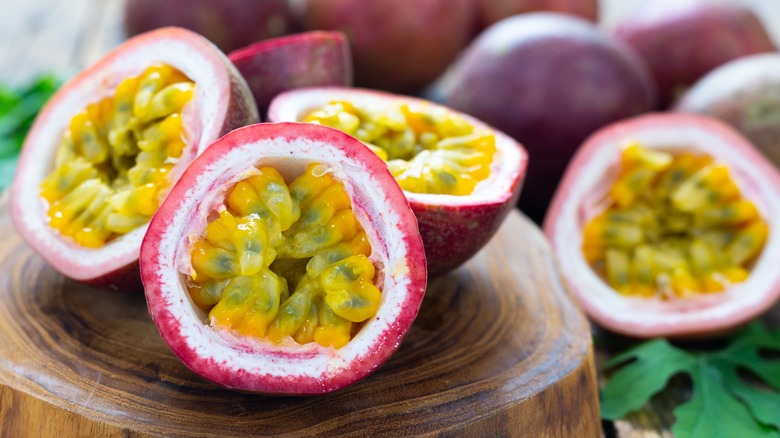How To Properly Store Passionfruit
Passionfruit is one of the most delicious fruit choices and is a versatile ingredient for dishes such as tropical passionfruit pavlovas and smoothies. There are so many ways to use them that they're the sort of food you use too quickly, not slowly. Still, when it comes to storing passionfruit, there are a few things to note. As a general rule, when left whole at room temperature, they have a shelf life of up to two weeks.
Yet, if you leave them in the fridge (ideally in a sealed container or bag), this can extend to a whole month, as refrigerating prevents dehydration. You'll want to avoid cutting your passionfruit, as this reduces this time to just seven to 10 days and necessitates fridge-storing the pieces in an airtight container. It's therefore best to keep your passionfruit whole. This fruit is also an ideal candidate for freezing to lengthen its lifespan.
If you freeze your passionfruit, it can last for a whopping three months. It can be frozen whole, or you can scoop out the pulp first; some people even make flavored ice cubes out of it. Nutritionally speaking, it may be best to freeze your fruit if you plan to store it for lengthy durations, as it helps maintain the passionfruit at its absolute peak freshness, aiding optimal nutrition.
Signs that your passionfruit has expired
It isn't just about checking the color and size of passionfruit to see whether it's ripe to eat. What about if it's gone past that point? What are the signs that passionfruit has expired? There are five things to consider: outer appearance, the pulp's qualities, overall taste and smell, and the presence of mold. The skin of a passionfruit that's surpassed its best will appear shrunken and excessively wrinkled, both of which are huge red flags. Any discoloration or mushiness to the touch is another big "no-go".
If you proceed past this stage, you'll find that expired fruit has a vinegar-like aroma and dry or even unusually colored pulp — forget that bursting yellow we all love so much. Any slimy textures rather than a juicy quality should land your passionfruit straight in the bin (the same goes if you see any mold). Other warning signs include an unpleasant taste, but let's hope you don't reach that point.
Fortunately, it's rare for passionfruit to go off, as storing them correctly is so easy. Weigh up that initial storage decision carefully, and freeze or refrigerate your fruit whole if you want to keep it for a while. It's better to be safe than sorry. And if you find yourself with too much passionfruit on your hands, look at alternative recipes – for example, passionfruit makes a great swap for lemons in a curd.

